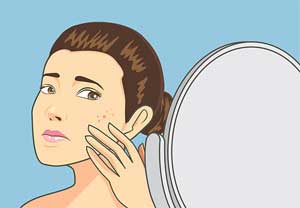- Home
- Editorial
- News
- Practice Guidelines
- Anesthesiology Guidelines
- Cancer Guidelines
- Cardiac Sciences Guidelines
- Critical Care Guidelines
- Dentistry Guidelines
- Dermatology Guidelines
- Diabetes and Endo Guidelines
- Diagnostics Guidelines
- ENT Guidelines
- Featured Practice Guidelines
- Gastroenterology Guidelines
- Geriatrics Guidelines
- Medicine Guidelines
- Nephrology Guidelines
- Neurosciences Guidelines
- Obs and Gynae Guidelines
- Ophthalmology Guidelines
- Orthopaedics Guidelines
- Paediatrics Guidelines
- Psychiatry Guidelines
- Pulmonology Guidelines
- Radiology Guidelines
- Surgery Guidelines
- Urology Guidelines
Compared to antibiotics, Spironolactone may be safe first line treatment for Acne

USA: Spironolactone can be a potential alternative to oral antibiotics for the treatment of women with acne -- is the bottom line of a recent study. The findings of the study have appeared in the Journal of the American Academy of Dermatology.
The study has found that spironolactone can provide a durable treatment effect over time in women with acne and also, the treatment is safe. The authors encourage the use of spironolactone as a first-line agent in this population given the concern regarding antibiotic overuse and chronicity of acne in the female patients.
Also Read: Sarecycline new treatment for acne, now commercially available
Female patients often encounter acne in their adulthood. It is important to identify which options can provide a durable treatment effect over time. Spironolactone is emerging as a potential alternative to oral antibiotics. However, little is known about long-term outcomes with spironolactone for those who have an initial positive response and how it compares to other alternatives. John S. Barbieri, Department of Dermatology, University of Pennsylvania Perelman School of Medicine, Philadelphia, USA, and colleagues conducted the study to determine long-term outcomes with spironolactone
“Long-term oral antibiotic use in acne may be associated with a variety of adverse effects including antibiotic resistance, pharyngitis, inflammatory bowel disease, and breast and colon cancer,” Barbieri, from the University of Pennsylvania Perelman School of Medicine, and colleagues wrote. “Spironolactone may represent an effective and safe alternative to oral antibiotics for women with moderate to severe acne, however, comparative studies are lacking.”
Also Read: PGI doctors come out with home-based treatment for acne scarring
The researchers conducted a retrospective analysis of data from 4321 female patients treated with spironolactone and 7517 female patients treated with oral tetracycline-class antibiotics for acne for a period of at least 12 months. The mean duration of use of spironolactone was 697.8 days compared with 604.4 days for oral tetracycline-class antibiotics. The hazard ratio for treatment discontinuation was 0.74 for spironolactone compared with oral antibiotics.
For detailed study log to DOI: https://doi.org/10.1016/j.jaad.2019.03.036

Disclaimer: This site is primarily intended for healthcare professionals. Any content/information on this website does not replace the advice of medical and/or health professionals and should not be construed as medical/diagnostic advice/endorsement or prescription. Use of this site is subject to our terms of use, privacy policy, advertisement policy. © 2020 Minerva Medical Treatment Pvt Ltd